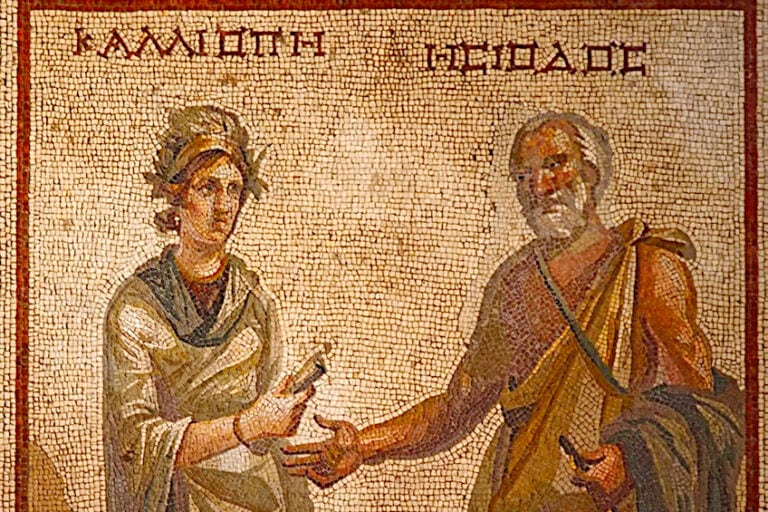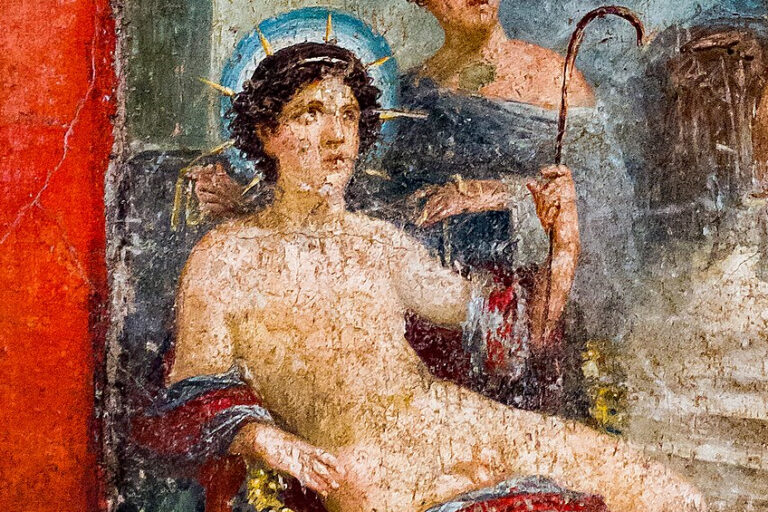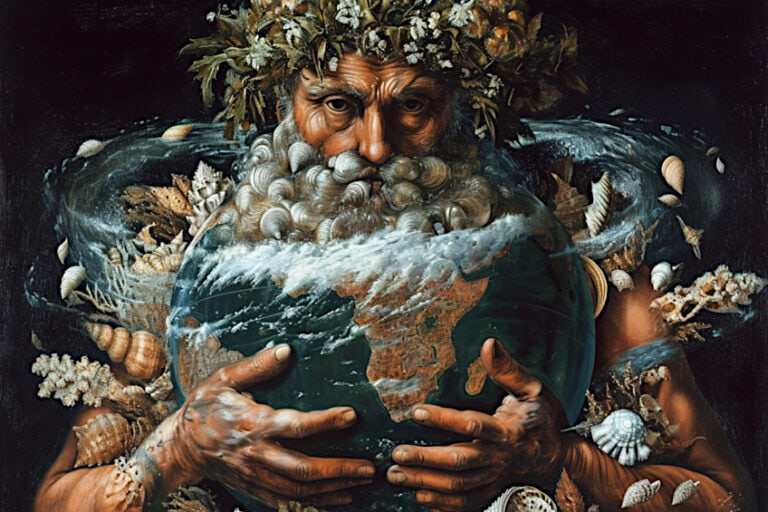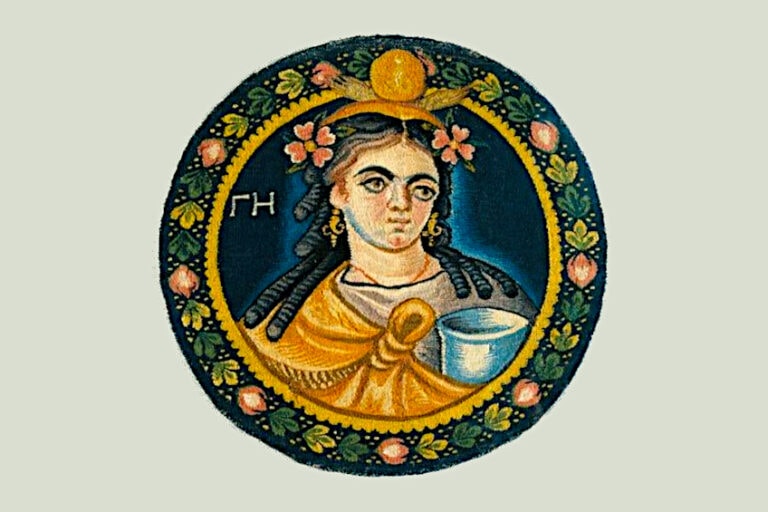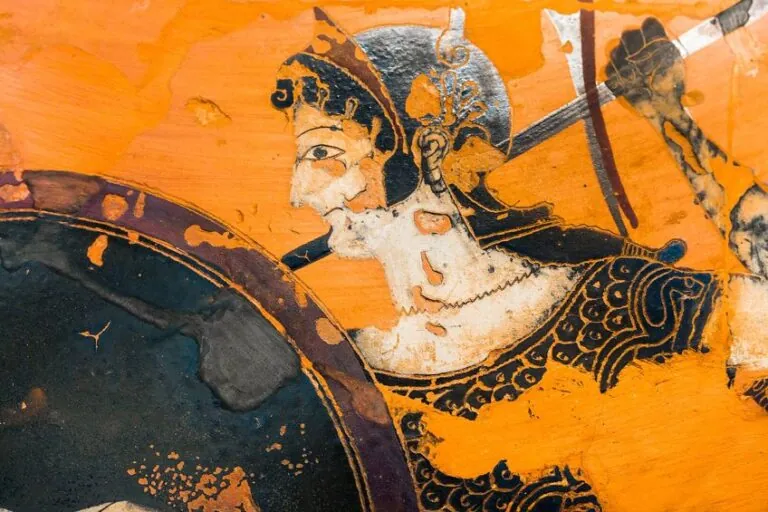Greek God Perses – An Obscure Agent of Obliteration
There are many figures in ancient Greek mythology that are complete mysteries, either because they had little influence to begin with or their legacy has been lost to time. One of these figures is that of the Greek god Perses, a Titan of Greek myth shrouded in obscurity and surrounded by whispers of devastation and war. We have explored his mentions in both the surviving traditional writings and modern media in the article below, so join us as we examine for ourselves this Titan god lost to the ages!
Contents
Overview of the Titan Perses
| Name | Perses |
| Gender | Male |
| God of | Destruction |
| Personality | Wise and belligerent |
| Consorts | Asteria |
| Children | Hecate and Chariclo |
| Parents | Krios and Eurybia |
The Greek god Perses is believed to be a Titan, only truly known by his name and his familial connection to the goddess of magic Hecate. This was not uncommon with Titans in Greek mythology as their role is often to explain cosmogony or fulfill a space in the genealogy of the gods.
Perses is also confused with the King Perses of Colchis, a cruel usurper also said to be a father to Hecate, queen of witches.
Background of the Greek God Perses
Very little is known about the Greek god Perses, other than mentions of his name in connection to his family in classical literature. The Titan’s name is taken from the words ‘persô’ or ‘perthô’ generally meaning “to sack”, “to ravage” or “to destroy”. This has led to some ascribing him as a god of destruction though there is no literature to support it.
Perses’ Familial Relations
Perses was the son of the Titans Krios and Eurybia and is thus considered a Titan of the “second generation”. His father Krios was one of Gaia’s twelve Titan children, according to Hesiod, and one of the “pillars of heaven” during the reign of Kronos. His mother was Eurybia, the flint-hearted daughter of the primordial Gaia and the sea god Pontus.
He was one of three sons, the other two being the gods Pallas and Astraeus who is also known as Astraios.
Perses would marry his niece Asteria, the daughter of the Titan pair of Koios and shining Phoebe. Perses is considered to be the father of Hecate, the goddess of magic, by his wife Asteria. He is also a candidate to be the Perses mentioned as the father of the nymph Chariclo, who fostered several heroes of Greek Mythology alongside her husband the centaur Chiron.
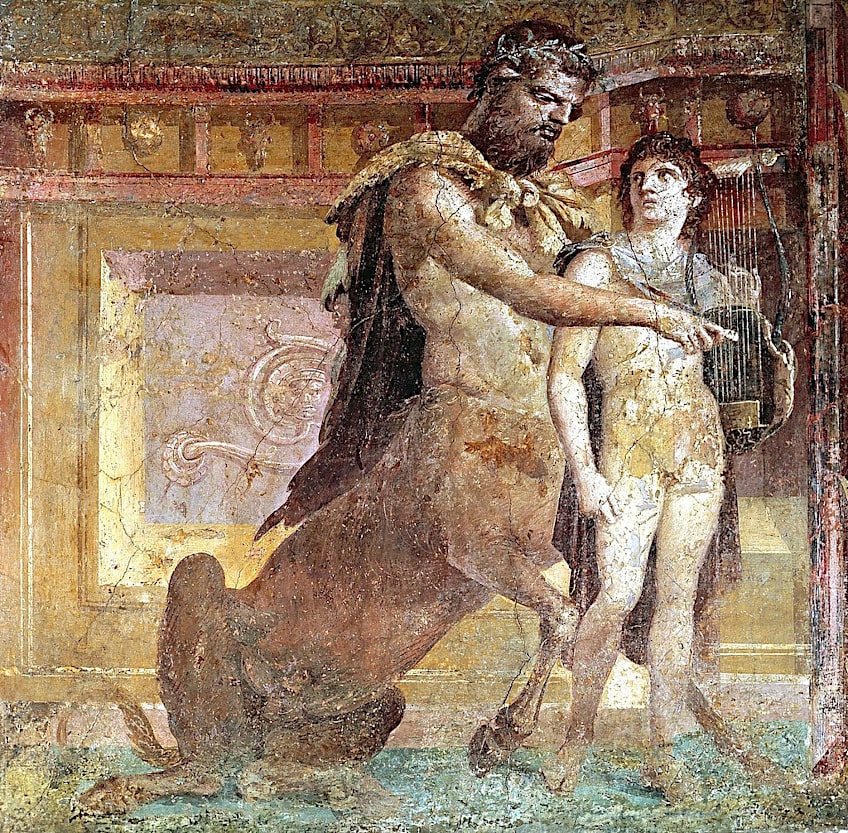 Fresco from Herculaneum showing the Centaur Chiron teaching the young Achilles to play the lyre (1st Century CE); upload by muesse, Public domain, via Wikimedia Commons
Fresco from Herculaneum showing the Centaur Chiron teaching the young Achilles to play the lyre (1st Century CE); upload by muesse, Public domain, via Wikimedia Commons
The Significance of Perses in Greek Mythology
Titans are traditionally far off names whose sole purpose is to flesh out the genealogy and cosmogony of the ancient Greek creation narrative. They explain how and why various concepts existed according to the ancient Greek understanding of their world.
Usually fringe figures from a bygone age in history, they have little active roles in myth or cult life on the whole outside of their genealogical connection to far more important gods.
With the surviving classical works we have Perses is known almost exclusively in this role, existing mainly as a parent of Hecate and presumably contributing to the convention of her great power and claim over sky, land, and sea.
Constellation Commentaries on Perses
Some commentaries hold that Perses may have been associated with the stars and war in conjunction with his father and brothers. Part of this comes from his name loosely translated to “the destroyer” with the war-like connotations of laying waste to a place or sacking. His brother Pallas, meaning “spear-brandishing”, is father to several war-like gods embodying Force, Power, Victory, and Rivalry, also known as Bia, Kratos, Nike, and Zelos respectively.
It has been suggested that Pallas and Perses were associated with their own constellations much like their father Krios was with the Aries constellation that could rise to signal the new year each spring.
Pallas is considered to preside over the Auriga constellation while Perses may have been connected to the constellation Perseus, which with their father would rise and heralded the beginning of campaigning season to the ancient Greeks. If this was the case, then his role as a war god may have afforded him offerings or honors to procure a good campaign. However this is an unusual ascription, since the constellation Perseus is more commonly associated with the hero of the same name.
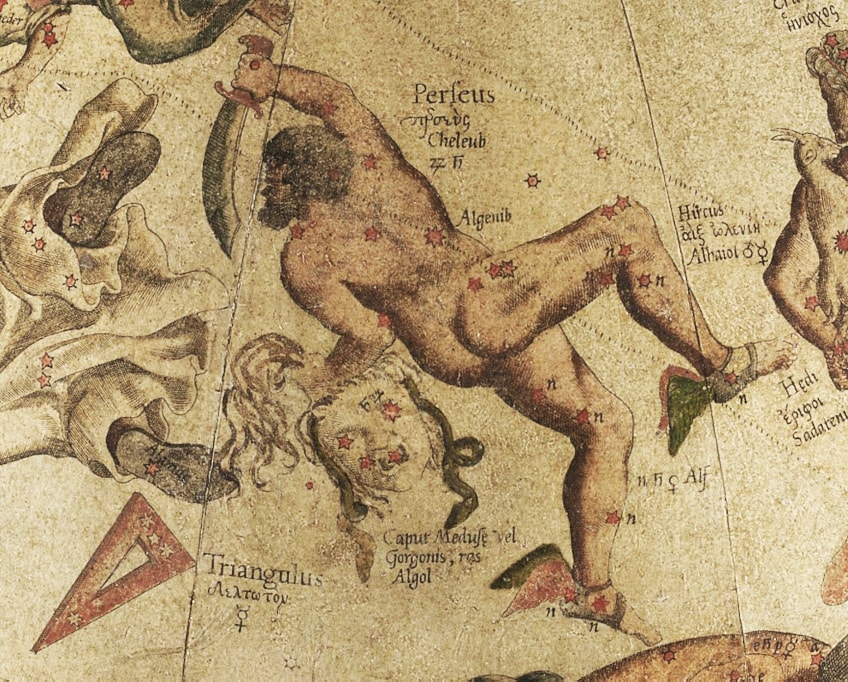 Depiction of the Perseus constellation on the Mercator celestial globe (1551); Gerard Mercator (1512-1594), Public domain, via Wikimedia Commons
Depiction of the Perseus constellation on the Mercator celestial globe (1551); Gerard Mercator (1512-1594), Public domain, via Wikimedia Commons
An alternate association held that the three brothers were connected with the seasons more directly. Perses with the dog-star Sirius which brings the heat and droughts of the height of summer, Pallas and the star Capella who marked seasonal storms to come, and Astraios the father of the four winds who perhaps overlapped with the god Aristaios who brought cooling Etesian winds after the scorching season the Sirius star heralded in Ceos.
These are theories not supported by any classical sources, and Krios’ association with the ram constellation is mostly from his name meaning “ram” and his “southern” association as a pillar of heaven rather than any direct mentions, but the theories are thought-provoking concepts nonetheless.
Perses in the Titanomachy
We know very little about Perses, though it could be assumed he partook in the Titanomachy. The ten-year war between Zeus and Kronos for rulership of the cosmos ended with Zeus the victor and many male Titans imprisoned in Tartarus.
Perses is not on the list of Titans that were imprisoned after the fall of the Titans.
However, considering Zeus’ pursuit of Perses’ wife Asteria while she fled his advances in the guise of a quail and then became the barren island of either Ortygia or Delos, it is a possibility that he was indeed imprisoned.
 Perses’ wife Asteria first transformed into a quail and then into either the barren island of Ortygia or Delos to escape Zeus; artist’s impression
Perses’ wife Asteria first transformed into a quail and then into either the barren island of Ortygia or Delos to escape Zeus; artist’s impression
King Perses of Colchis
Perses is also the name of the King of Colchis, a son of Helios by the oceanid Perse, who usurped his brother Aeëtes after Medea assisted in stealing the golden fleece from Jason. An oracle had warned Aeëtes of the perils caused if the fleece ever left Colchis and the “lawless” and “exceedingly cruel” Perses did indeed usurp him before being slain by his niece Medea or her son Medus. The Bibliotheca historica (1st century BCE) says that King Perses was also the father of Hecate, who married Aeëtes and had Medea and Circe, though the distinction between the Titan Perses and the King Perses is ostensibly a clear one.
A third Perses in mythology, this time the son of Perseus and Andromeda, was believed by the Greeks to be the ancestor of the Persian people.
The Mystery of Perses
Aside from Perses’ name, we know only that the Titan was considered by Hesiod to hold a wisdom that surpassed all other men. No context remains of why this might have been, but with his wife Asteria and daughter Hecate’s associations with magical knowledge, it stands to reason he too could have been of great intellect. As a Titan he is considered to possess the great power and physique, as well as the more eager to fight nature, they are generally associated with. Other than Hesiod’s one descriptor there is no classical documentation of his personage, his worship, any honoring he may have had in relation to his daughter Hecate, or anything one could consider sacred or to be one of Perses’ symbols.
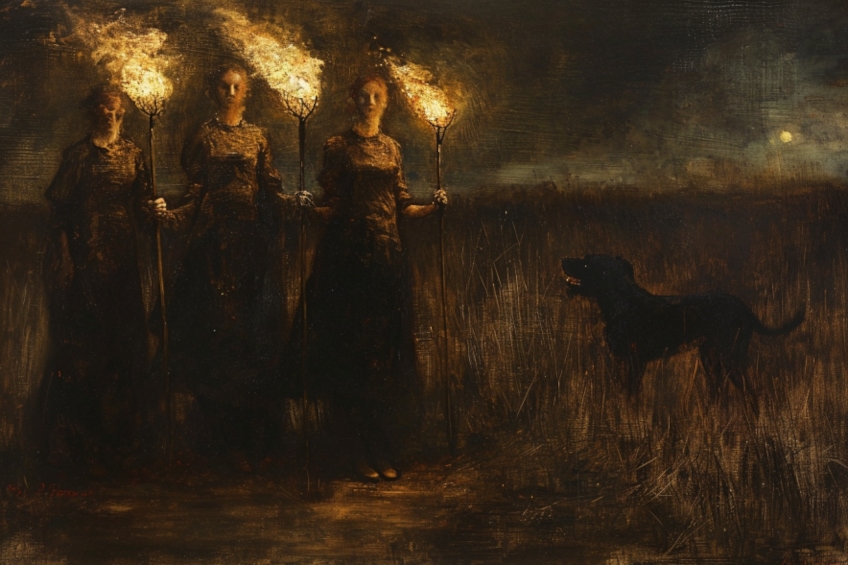 Perses is predominantly known as father of the triple-goddess Hecate, the ancient Greek queen of witches; artist’s impression
Perses is predominantly known as father of the triple-goddess Hecate, the ancient Greek queen of witches; artist’s impression
We have no currently discovered instances of Perses being honored, like Asteria has become through her association with the sacred Isle Delos, nor if he had a main myth at all. It has been suggested that many Titans were literally rather than metaphysically filling the gaps in the creation narrative and subsequent myths. Names without meaning that rounded out group numbers pleasingly or fixed conflicts in the various Greek mythic traditions. Perses having only a name and genealogy may lend support to this theory, though Hesiod’s description of him as the wisest of all men may also hint at a lost deed or myth surrounding the Titan.
His suggested links with war and destruction also give our mystery Titan an intimidating aura whether he is an active force or a philosophical embodiment.
The dearth of information we have on the Titan Perses means his mythos is wide open for speculation, such as his domain being that of destruction. Perses is a complete mystery for all modern writings and thus his depictions in art and literature are often up to the interpretation of both artist and viewer.
 Since traditional representations of Perses are rare, modern depictions are entirely open to artistic interpretation; artist’s impression
Since traditional representations of Perses are rare, modern depictions are entirely open to artistic interpretation; artist’s impression
Modern Ideas of the Titan Perses
Titans were considered to bring something to the world stage, either ruling a specific area, embodying a unique quality, or in some way having a hand in something’s creation. Various modern sources online have noted Perses’ name comes from the word ‘persô’, which itself has shaky origins. It is commonly translated to mean “to destroy” but the word also has uses in the realm of “to ravage” or “to sack” which have war-like connotations.
While the etymology of his name has led to the idea that Perses was the Titan god of destruction, specifically that of war and the chaos, confusion, and losses of land and life that it brings, any direct reference to his domain has been lost to time.
This could be considered ironic, that Perses’ role emphasizing the destruction and loss caused by war came about due to the loss of his own traditional believers to war and infighting. As a human race prone to war perhaps Perses, familiar as he is with its devastation, could serve as a warning about all that could be lost in the ravages of conflict. From folktales passed down to local practices across ancient Greece, the lived culture that may have held the pieces of Perses will always leave us wondering in their absence. Perses as the god of destruction highlights the tragic loss of culture and human experiences that wars have wiped out over the millennia.
 View of the only structure not completely destroyed in Hiroshima in Japan in the aftermath of the atom bomb dropped on the city on August 6 1946; shankar s. from Poona (pune), India, India, Public domain, via Wikimedia Commons
View of the only structure not completely destroyed in Hiroshima in Japan in the aftermath of the atom bomb dropped on the city on August 6 1946; shankar s. from Poona (pune), India, India, Public domain, via Wikimedia Commons
The modern speculation surrounding Perses lends us an interesting look into how mythology changes through the ages to reflect the population it is being observed by. Through the centuries mythology meaning is made, lost, and remade to match the values and rules of the people telling the stories. Perhaps in the eyes of the ancient Greeks the Titan Perses did have connections to the observed stars and their seasonal motions, but for a modern writer, he may predominantly embody the devastation all war leaves in its wake in both physical destruction and loss of life. Whether in a traditional sense or a modern interpretation, the Titan Perses is an enigmatic but evident force in the world.
The Greek god Perses is obscure, even among other Titans, despite his powerful relations. With only a foreboding name and his place as the father of the great goddess Hecate, many have been entranced to dig deeper into this mystery. The speculation that fills the dearth of sources surrounding Perses has been a fascinating look into the creation of myth traditions that we hope you have enjoyed alongside us.
Frequently Asked Questions
What Was Perses the God Of?
With little classical sources, we have no idea what his domain may have been if he had one to the ancient Greeks. His name, with its destructive and war-like connotations, has led to people assigning him the title of Titan of Destruction, though it is largely unsupported in the texts. Commentaries linking him and his family with constellations have suggested that he may have had links with war and the seasons.
What Was the Significance of the Titan Perses?
Without much classical sources remaining on Perses, his role in myth falls into that of genealogy. Titans often had little to no active role in myth and filled gaps in cosmogony or godly genealogy. The Titan Perses himself is mostly referred to in his role as father to the Greek goddess of magic, Hecate. He may have had greater significance, hinted to by Hesiod naming him the wisest among men, but none have yet survived to the modern day.
Who Was Perses in Greek Mythology?
It can be confusing to figure out who was Perses, with several figures claiming the name. Perses is a name shared by three figures in Greek mythology. Perses the Titan is the husband of Asteria and father of Hecate, while King Perses was a son of Helios and the ruler of Colchis through usurping his brother, Aeëtes. There is also Perses, the son of Perseus, who was considered to be the ancestor of the Persian people.

I am deeply passionate about history and am constantly fascinated by the rich and complex stories of the past. As the editor-in-chief of learning-history.com, I have the opportunity to share this passion with a wide audience through the creation and distribution of engaging and informative content about historical events, persons, and cultures. Whether it’s through writing articles and blog posts or creating videos or podcasts, I strive to bring the past to life in a way that is both accurate and enjoyable. My expertise in history, combined with my strong writing and communication skills, allows me to effectively communicate complex historical concepts and make them accessible and interesting to a wide range of readers. I am truly grateful for the opportunity to share my love of history with others through my work on learning-history.com.


